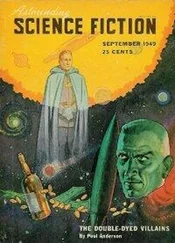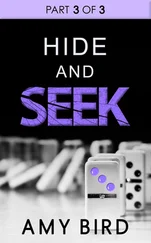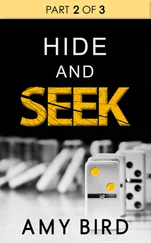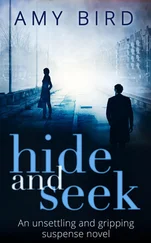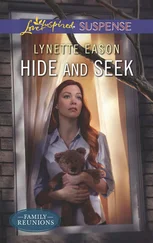Уилки Коллинз - Hide and Seek
Здесь есть возможность читать онлайн «Уилки Коллинз - Hide and Seek» весь текст электронной книги совершенно бесплатно (целиком полную версию без сокращений). В некоторых случаях можно слушать аудио, скачать через торрент в формате fb2 и присутствует краткое содержание. Год выпуска: 2005, Жанр: Классическая проза, на английском языке. Описание произведения, (предисловие) а так же отзывы посетителей доступны на портале библиотеки ЛибКат.
- Название:Hide and Seek
- Автор:
- Жанр:
- Год:2005
- ISBN:нет данных
- Рейтинг книги:5 / 5. Голосов: 1
-
Избранное:Добавить в избранное
- Отзывы:
-
Ваша оценка:
- 100
- 1
- 2
- 3
- 4
- 5
Hide and Seek: краткое содержание, описание и аннотация
Предлагаем к чтению аннотацию, описание, краткое содержание или предисловие (зависит от того, что написал сам автор книги «Hide and Seek»). Если вы не нашли необходимую информацию о книге — напишите в комментариях, мы постараемся отыскать её.
Hide and Seek — читать онлайн бесплатно полную книгу (весь текст) целиком
Ниже представлен текст книги, разбитый по страницам. Система сохранения места последней прочитанной страницы, позволяет с удобством читать онлайн бесплатно книгу «Hide and Seek», без необходимости каждый раз заново искать на чём Вы остановились. Поставьте закладку, и сможете в любой момент перейти на страницу, на которой закончили чтение.
Интервал:
Закладка:
“Now, recollect your promise,” whispered Valentine to the clown’s wife, who was slowly pushing him out all the time he was speaking to her. “You must bring little Mary to the Rectory to-morrow morning at twelve o’clock exactly—you must! or I’ll come and fetch her myself—”
“I’ll bring her, sir, if you’ll only go now. I’ll bring her—I will, as true as I stand here!”
“If you don’t!” cried Valentine, still distrustful, and trembling all over with agitation—“If you don’t!”—He stopped; for he suddenly felt the open air blowing on his face. The clown’s wife was gone, and nothing remained for him to threaten, but the tattered horse-cloths that hung over the empty doorway.
CHAPTER IV.
MADONNA’S MOTHER.
It is a quarter to twelve by the hall clock at the Rectory, and one of the finest autumn mornings of the whole season. Vance, Doctor Joyce’s middle-aged man servant, or “Bishop” Vance, as the small wits of Rubbleford call him, in allusion to his sleek and solemn appearance, his respectable manner, his clerical cravat, and his speckless black garments, is placing the cake and cowslip wine on the dining-table, with as much formality and precision as if his master expected an archbishop to lunch, instead of a clown’s wife and a little child of ten years old. It is quite a sight to see Vance retiring and looking at the general effect of each knife and fork as he lays it down; or solemnly strutting about the room, with a spotless napkin waving gently in his hand; or patronisingly confronting the pretty housemaid at the door, and taking plates and dishes from her with the air of a kitchen Sultan who can never afford to lose his dignity for a moment in the presence of the female slaves.
The dining-room window opens into the Rectory garden. The morning shadows cast by the noble old elm-trees that grow all round, are fading from the bright lawn. The rich flower-beds gleam like beds of jewels in the radiant sunshine. The rookery is almost deserted, a solitary sleepy caw being only heard now and then at long intervals. The singing of birds, and the buzzing of busy insects sound faint, distant, and musical. On a shady seat, among the trees, Mrs. Joyce is just visible, working in the open air. One of her daughters sits reading on the turf at her feet. The other is giving the younger children a ride by turns on the back of a large Newfoundland dog, who walks along slowly with his tongue hanging out, and his great bushy tail wagging gently. A prettier scene of garden beauty and family repose could not be found in all England, than the scene which the view through the Rectory window now presents. The household tranquillity, however, is not entirely uninterrupted. Across the picture, of which Vance and the luncheon-table form the foreground, and the garden with Mrs. Joyce and the young ladies the middle-distance and background, there flits from time to time an unquiet figure. This personage is always greeted by Leo, the Newfoundland dog, with an extra wag of the tail; and is apostrophized laughingly by the young ladies, under the appellation of “funny Mr. Blyth.”
Valentine has in truth let nobody have any rest, either in the house or the garden, since the first thing in the morning. The rector having some letters to write, has bolted himself into his study in despair, and defies his excitable friend from that stronghold, until the arrival of Mrs. Peckover with the deaf and dumb child has quieted the painter’s fidgety impatience for the striking of twelve o’clock, and the presence of the visitors from the circus. As for the miserable Vance, Mr. Blyth has discomposed, worried, and put him out, till he looks suffocated with suppressed indignation. Mr. Blyth has invaded his sanctuary to ask whether the hall clock is right, and has caught him “cleaning himself” in his shirt sleeves. Mr. Blyth has broken one of his tumblers, and has mutinously insisted on showing him how to draw the cork of the cowslip wine bottle. Mr. Blyth has knocked down a fork and two spoons, just as they were laid straight, by whisking past the table like a madman on his way into the garden. Mr. Blyth has bumped up against the housemaid in returning to the dining-room, and has apologized to Susan by a joke which makes her giggle ecstatically in Vance’s own face. If this sort of thing is to go on for a day or two longer, though he has been twenty years at the Rectory, Vance will be goaded into giving the doctor warning.
It is five minutes to twelve. Valentine has skipped into the garden for the thirtieth time at least, to beg that Mrs. Joyce and the young ladies will repair to the dining-room, and be ready to set Mrs. Peckover and her little charge quite at their ease the moment they come in. Mrs. Joyce consents to this proposal at last, and takes his offered arm; touching it, however, very gingerly, and looking straight before her, while he talks, with an air of matronly dignity and virtuous reserve. She is still convinced that Mr. Blyth’s principles are extremely loose, and treats him as she might have treated Don Juan himself under similar circumstances.
They all go into the dining-room. Mrs. Joyce and her daughters take their places, looking deliciously cool and neat in their bright morning dresses. Leo drops down lazily on the rug inside the window, with a thump of his great heavy body that makes the glasses ring. The doctor comes in with his letters for the post, and apostrophizes Valentine with a harmless clerical joke. Vance solemnly touches up the already perfect arrangement of the luncheon table. The clock strikes twelve. A faint meek ring is heard at the Rectory bell.
Vance struts slowly to the door, when—Heaven and earth! are no conventions held sacred by these painters of pictures?—Mr. Blyth dashes past him with a shout of “Here they are!” and flies into the hall to answer the gate himself. Vance turns solemnly round towards his master, trembling and purple in the face, with an appealing expression, which says plainly enough:—“If you mean to stand this sort of outrage, sir, I beg most respectfully to inform you that I don’t.” The rector bursts out laughing; the young ladies follow his example; the Newfoundland dog jumps up, and joins in with his mighty bark. Mrs. Joyce sits silent, and looks at Vance, and sympathizes with him.
Mr. Blyth is soon heard again in the hall, talking at a prodigious rate, without one audible word of answer proceeding from any other voice. The door of the dining-room, which has swung to, is suddenly pushed open, jostling the outraged Vance, who stands near it, into such a miserably undignified position flat against the wall, that the young ladies begin to titter behind their handkerchiefs as they look at him. Valentine enters, leading in Mrs. Peckover and the deaf and dumb child, with such an air of supreme happiness, that he looks absolutely handsome for the moment. The rector, who is, in the best and noblest sense of the word, a gentleman, receives Mrs. Peckover as politely and cordially as he would have received the best lady in Rubbleford. Mrs. Joyce comes forward with him, very kind too, but a little reserved in her manner, nevertheless; being possibly apprehensive that any woman connected with the circus must be tainted with some slight flavor of Miss Florinda Beverley. The young ladies drop down into the most charming positions on either side of the child, and fall straightway into fits of ecstasy over her beauty. The dog walks up, and pokes his great honest muzzle among them companionably. Vance stands rigid against the wall, and disapproves strongly of the whole proceeding.
Poor Mrs. Peckover! She had never been in such a house as the Rectory, she had never spoken to a doctor of divinity before in her life. She was very hot and red and trembling, and made fearful mistakes in grammar, and clung as shyly to Mr. Blyth as if she had been a little girl. The rector soon contrived, however, to settle her comfortably in a seat by the table. She curtseyed reverentially to Vance, as she passed by him; doubtless under the impression that he was a second doctor of divinity, even greater and more learned than the first. He stared in return straight over her head, with small unwinking eyes, his cheeks turning slowly from deep red to dense purple. Mrs. Peckover shuddered inwardly, under the conviction that she had insulted a dignitary, who was hoisted up on some clerical elevation, too tremendous to be curtseyed to by such a social atom as a clown’s wife.
Читать дальшеИнтервал:
Закладка:
Похожие книги на «Hide and Seek»
Представляем Вашему вниманию похожие книги на «Hide and Seek» списком для выбора. Мы отобрали схожую по названию и смыслу литературу в надежде предоставить читателям больше вариантов отыскать новые, интересные, ещё непрочитанные произведения.
Обсуждение, отзывы о книге «Hide and Seek» и просто собственные мнения читателей. Оставьте ваши комментарии, напишите, что Вы думаете о произведении, его смысле или главных героях. Укажите что конкретно понравилось, а что нет, и почему Вы так считаете.



